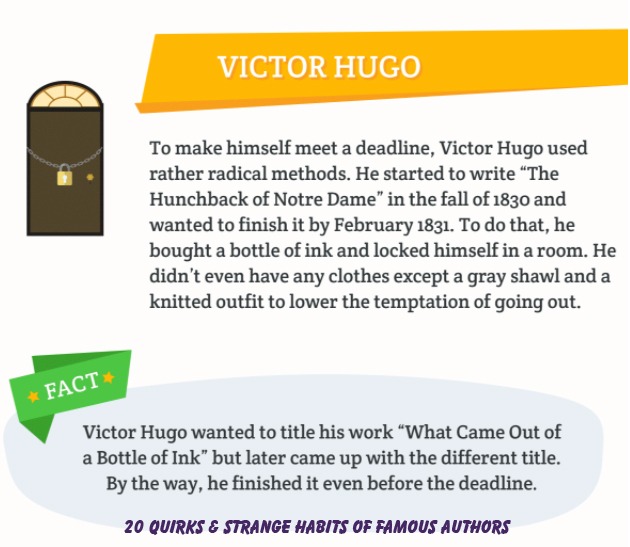It’s Ok – Writers should be Strange ! A simple writing habit changed my life as an Author of Guardian of Angels and life is ever on a fast track lane performing roles. Reading is my super power and so is writing – writing Contents and Book Reviews. My habit revolves around using my Library – reference books or just hug my Books cupboard and writing comes naturally. Another habit has always been Listening – Listening to Western Pop in the background, speed thoughts and writing comes automatically ! And I Admit, I ain’t famous but sure inspired with many well known and famous Authors who had wierd or strange habits that hooked them to writing and even cope with the writers block. Every writer has a strategy as they pen words. A piece of a genius has remarkable skills and intelligence. Passion plays a role and so do habits – be it weird or die hard habits !
Check this Infographic :
20 Quirks and Strange Habits – The weird side of Famous Writers :
James Joyce
James Joyce preferred writing while lying down on his stomach. He used large blue pencils and wore a white coat while writing. All of those habits, however, weren’t the result of weirdness. Most of them were due to his poor eyesight. Large pencils allowed him to see what he was writing, while the coat reflected more light on a page.
Fact: He wrote most of “Finnegans Wake” using pieces of crayon and cardboard.
Virginia Woolf
Virginia Woolf would write every morning for two and a half hours. Not weird enough? She used a desk that was 3.5 feet tall and had an angled top. This allowed Woolf to evaluate her work both from a distance and up-close. This quirk was sparked by Virginia’s rivalry with her sister, Vanessa, who painted standing. Thus, Virginia didn’t want to be outdone.
Franz Kafka
Franz Kafka used quite a radical method of boosting his creativity. He exhausted himself. At first, he worked 12-hour shifts but later was promoted. However, with all the new responsibilities and other activities (exercising, spending time with family), he usually started writing at around 11 p.m. and could go on up until 6 a.m.
Truman Capote
Truman Capote was quite superstitious. Which bordered on having a slight weirdness to it. Truman never started or finished a piece of work on a Friday. He also changed his hotel room if the numbers added up to 13. Another superstition: there were never more than two cigarette butts in Capote’s ashtray. He kept the extra ones in pockets of his coat.
Victor Hugo
To make himself meet a deadline, Victor Hugo used rather radical methods. He started to write “The Hunchback of Notre Dame” in the fall of 1830 and wanted to finish it by February 1831. To do that, he bought a bottle of ink and locked himself in a room. He didn’t even have any clothes except a gray shawl and a knitted outfit to lower the temptation of going out.
Fact: Victor Hugo wanted to title his work “What Came Out of a Bottle of Ink” but later came up with the different title. By the way, he finished it even before the deadline.
Edgar Allan Poe
Edgar Allan Poe was one of those authors who extremely loved their pets. But Poe took it to another level. He loved his cat Catterina so much that he considered it his guardian. To make matters even more mysterious, rumors say that Catterina died two weeks after Poe’s death.
Flannery O’Connor
She had a strong affection for domestic poultry. It started from having a chicken in childhood and developed into a collection of turkeys, pheasants, a quail, and a duck. One time, she even mail-ordered for six peacocks, a peahen, and four peachicks.
Anthony Burgess
The author of “A Clockwork Orange” had a curious way of overcoming hard or boring tasks. If he had to make a detailed description, he picked up a dictionary, opened a random page, and used words on that page to complete his task.
Fact: Burgess himself admits that his novel “MF” contains the result of such a trick. He used words from R.J. Wilkinson’s Malay-English Dictionary to describe a hotel vestibule.
Friedrich Schiller
Friedrich Schiller had a habit that was even more on the weird side than the other writers mentioned here. He left apples in a drawer of his desk and let them spoil on purpose. The reason was he liked the smell they produced, and it inspired him somehow.
Agatha Christie
Agatha Christie also used apples to fuel her inspiration. But in a more usual way. Which was still a bit strange, nonetheless. She loved to eat apples while in the bathtub and examining murder photos.
Alexandre Dumas
Dumas had a quirk related to color-coding. He used a particular shade of blue paper on which to write his fiction. For poetry, he had yellow paper. And Dumas’s articles were written on pink paper. Once, he ran out of blue paper. He was forced to use a cream-colored pad instead, which he thought negatively influenced that work of fiction.
William Faulkner
Faulkner loved to drink a lot of whiskey while writing. He developed this habit after meeting Sherwood Anderson. They used to go out a lot when they were both living in New Orleans.
Fact: Faulkner himself was quite pleased with this habit. He even once said, “And I thought then, if that was the life it took to be a writer, that was the life for me.”
Lewis Carroll
While sharing Virginia Woolf’s habit of working at a standing desk, Lewis Carroll also preferred writing with a specific color of ink. Purple. While working as a mathematics teacher at Oxford, Carroll used purple ink to correct students’ work. So, he continued using it when writing fiction.
Ernest Hemingway
As the author himself said, he wrote 500 words a day. He did this mostly in the morning to avoid the midday heat.
Fact: In his letter to F. Scott Fitzgerald, Hemingway said that he writes one page of a masterpiece, which he keeps, to 91 pages of garbage, which he promptly puts in the wastebasket.
Gertrude Stein
She found inspiration in routine tasks, no matter where she was. For instance, she could start writing sitting in the car while her partner was at a store. Busy Parisian streets and traffic inspired her greatly.
Vladimir Nabokov
Nabokov used index cards on which to write his works. He stored them in a slim box and could rearrange them at any time. This allowed Nabokov to write his works non-sequentially. He could also have a couple of such cards under his pillow in case an idea suddenly came into his head. So, he was always ready to write it down.
Jane Austen
Jane Austen was an author who cared deeply about her characters. She cared so much that she imagined their future lives even after finishing a novel. Austen’s nephew, Edward Austen-Leigh, wrote in A Memoir of Jane Austen, “She would, if asked, tell us many little particulars about the subsequent career of some of her people.”
Honoré de Balzac
Faulkner wasn’t the only one who liked his drinks. Honoré de Balzac found inspiration for writing his works in drinking coffee. So, he could consume up to 50 cups of it a day.
Fact: Studies suggest that Balzac almost hadn’t slept at all while writing “La Comédie Humaine.” Obviously, the reason for that was the amount of coffee he was drinking.
Arthur Conan Doyle
Despite creating a character with the strongest logic, the author Sir Arthur Conan Doyle himself wasn’t that rational. He dedicated himself to spiritualism after the death of his son in World War I, and even tried to speak with the dead. He also believed that his friend Harry Houdini had magical powers, no matter how Houdini tried to prove him wrong.
Dan Brown
Brown believes the best cure for writer’s block is hanging upside down. He said this so-called therapy helps him to relax and concentrate on writing. He also keeps an hourglass on his desk and puts his work aside each hour to do stretches, push-ups, and sit-ups.
Source Credits:
https://www.letterpressproject.co.uk/inspiring-older-readers/2018-03-20/the-weird-side-of-famous-writers-20-quirks-strange-habits
Published here too https://custom-writing.org/#famous-writers
About the Author: Jack Milgram is a writer at Custom-Writing.org. He started his freelance career when he was a student. Jack has been interested in writing since he first took pen and paper in his hands. And he never stopped writing ever after. He loves combining his job with traveling around the world.








